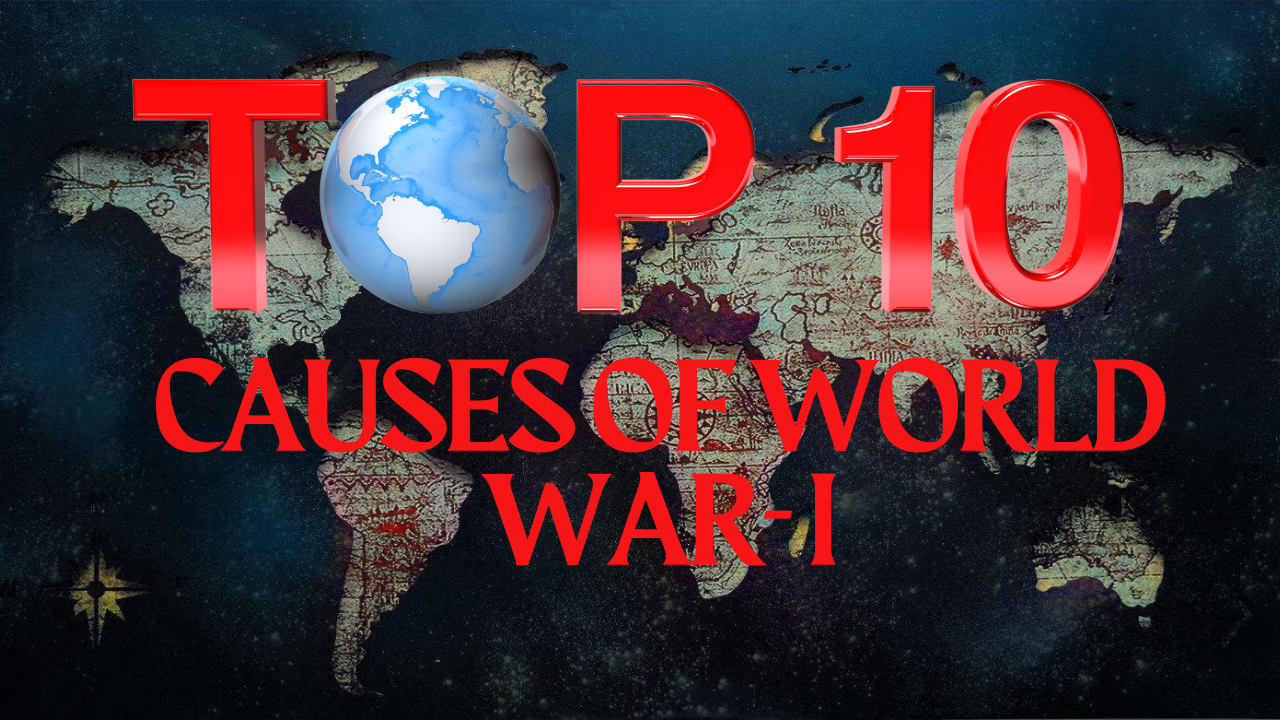Gavrilo Princip, a Serbian nationalist, murdered Archduke Franz Ferdinand in the small Balkan city of Sarajevo in June 1914.
Europe had previously experienced several high-profile assassinations in the years preceding this one, all of which horrified the international community but did not precipitate a significant crisis. This occurrence caused widespread concern throughout Europe and instigated a sequence of occurrences that culminated in the Great War, an enormous and violent armed conflict that claimed the lives of more than 17 million individuals in just over four years.
Attributing the origin of this conflict to a solitary assassination would be historically imprecise and unjust, given that a series of circumstances transpired both preceding and following the event.
The ten leading causes of the most catastrophic conflict of the 20th century are as follows:
10. Russian Expansion
Despite experiencing significant industrial unrest in the years leading up to the conflict, Russia had amassed the largest army on the planet by 1914. With a fleet of 16 airships and 360 aircraft, the Russian Army Air Service had surpassed all others as the preeminent air force globally within two years of its inception. Indeed, the army comprised a greater number of personnel than were available firearms.
Notwithstanding the tumultuous era of industrialization, the Russian Gross National Product (GNP) had risen substantially by 55 percent by 1913. The exponential expansion of a formidable adversary infuriated both Austria-Hungary and Germany, which were both awestruck by the strength of these numbers. This merely fueled the paranoia of European leaders and incentivized them to initiate one of the most massive arms races in human history.
9. Paranoia in Germany
While Germany ultimately bore responsibility for the invasion of neighboring countries, the German high command’s paranoia that Britain and its allies would arrive first primarily motivated this course of action.
During a period when the increasing strength of the German navy posed a threat to the unchallenged superiority of the British naval fleet, the United Kingdom adopted the most obvious precaution to ensure its safety.
The alliance formed by Britain, France, and Russia through the signing of the Triple Entente shifted the balance of power in favor of the British. However, this only increased Germany’s suspicion regarding the possibility of a European encirclement plot.
The heightened German paranoia that an imminent attack by the British alliance was imminent resulted in a corresponding escalation in German aggression.
8. Armed Conflict in Europe
During a period when nearly all Europeans were apprehensive about the imminent outbreak of war, numerous European nations engaged in a significant armaments race as a precautionary measure against the worst-case scenario.
The naval competition between Great Britain and Germany was the source of considerable animosity between the two countries and their respective alliances. Britain possessed 29 dreadnought battleships by 1914, and while Germany fell behind with 19 dreadnoughts, the rate at which it constructed new ones suggested it would surpass the British by 1920. Practically every significant European nation was engaged in a military expansion on land.
During the brief three-year span from 1910 to 1913, military spending in Europe increased by an unprecedented amount, from $1.67 billion annually to $2.15 billion.
7. The fall of the Ottoman Empire
Historically, the Ottoman Empire possessed formidable strength. It was the preeminent imperial power of the world during the Middle Ages and early modern times, with its dominion spanning the entirety of the Middle East, a significant portion of northern Africa, and eastern Europe. But by the end of the nineteenth century, internal strife and instability had nearly entirely destroyed the Ottoman Empire.
Subsequent to the commencement of the First Balkan War, Serbia (which was a member of the Balkan League at the time) annexed Albania. Given the likelihood that the Serbs would obtain access to the sea, an inevitable conflict between Austria-Hungary and Serbia was imminent.
The Russians, meanwhile, had their sights set on Britain and Armenia. It appeared that France was poised to conquer Syria and Iraq. Already, Germany felt excluded from the competition to expand its colonies and territory.
6. Imperialism
The main European powers had colonies throughout the globe prior to World War I. Significant portions of South Asia were under the British control, a considerable portion of Africa was under French colonial rule, and portions of South America were under Spanish rule.
The Europeans capitalised on the Renaissance era by establishing dominance over less developed countries in order to subjugate them. Countries such as Britain, France, Spain, and Russia possessed a significant advantage over Germany with regard to the expansion of their colonies.
The provision of basic materials and resources by new colonies proved to be highly profitable. As a consequence, these major powers endeavoured to capitalise on the disturbance in Europe, which only served to escalate the tensions among themselves.
5. Balkan Wars
The Balkan Wars arose due to the Ottoman Empire’s instability; the Balkan alliance, composed of Serbia, Greece, Montenegro, and Bulgaria, opposed the waning empire.
By the time of the First Balkan War broke out in 1913, they had effectively subdued the opposition and partitioned the Balkans among themselves. The major European superpowers were stunned by the decisive triumph of the Balkan League, but none were more astounded than Austria-Hungary, which categorically rejected the notion of Serbia becoming a sovereign nation.
The potential for Serbia to emerge as the epicentre of a future south Slavic state posed an enormous danger. Concurrently, France, Russia, and Britain vied for annexation territories in Armenia and the Middle East. Undoubtedly, the circumstances were made more dire by the fact that every opportunistic nation was lurking just around the corner in such a volatile situation.
4. Nationalism/Patriotism
The Slavic inhabitants of Bosnia and Herzegovina, seeking to capitalise on the unrest in the Slavic region, determined that the moment had come to secede from Austria-Hungary and incorporate into Serbia.
Notwithstanding the precarious state of affairs in the area, the apprehension of a war in which all major European superpowers would soon be engaged remained remote for many. A sequence of offensives precipitated by this occurrence drastically diminished the likelihood of a tranquil armistice. Nationalism contributed to the outbreak of conflict throughout Europe, not just in the Balkan region.
Every nation in the region regarded itself as a “inviolable territory,” reflecting the region’s intense nationalistic sentiment. The German conquest of Alsace-Lorraine in 1871 therefore failed to impress the French. The Balkan nations, newly established as a result of repeated conflicts in the Slavic region, were prepared to engage in combat with any European nation that attempted to annex them into new colonies.
3. Defence Mutual Alliances
As diplomatic relations deteriorated, European nations initiated the process of entering into mutual defence agreements with countries that could be relied upon during times of conflict. Due to the fact that these were treaties of mutual defence, in the event that an ally nation engaged in hostilities, the other nations were obligated to contribute to the defence of their ally.
As well as Germany, Austria, and Hungary, Russia and Serbia had formed an alliance prior to the outbreak of the First World War. Therefore, Russia and Germany’s subsequent involvement in the conflict between Austria-Hungary and Serbia did not come as a complete surprise.
However, it is worth noting that both Russia and Germany formed additional alliances with other European countries, thereby augmenting the number of participants in a dispute that ultimately escalated into a comprehensive war.
2. Absence of Global Laws
There are numerous rules in place today to ensure that nations maintain their unity in pursuit of international peace; noncompliance has repercussions and consequences, although their efficacy is somewhat dubious.
During the precarious stages of World War I, when Europe was on the verge of anarchy and disarray, there were no laws in place to prevent aggression between nations or to hold accountable those who annexed territories for imperialistic purposes.
Despite the emergence of an economy on a global scale by the late 19th century, the international community as a whole had yet to establish a framework of international law capable of prohibiting one country from employing violence against another. At the time, institutions tasked with fostering peace were largely ineffective and had little influence on the international community.
1. Assassination of Austrian Archduke Franz Ferdinand
Almost immediately after numerous events had escalated the impending war to its climax, this incident transformed a significant portion of Europe into an active war zone.
An intense conflict ensued between Serbia and Austria-Hungary over Bosnia’s desire to join Serbia. On June 28, 1914, Archduke Franz Ferdinand of Austria and his wife were in Sarajevo for a visit. Having narrowly avoided an assault by the Black Hand, a Serbian terrorist organisation, the couple was subsequently murdered in Sarajevo on the same day by Gavrilo Princip, a Serbian nationalist.
Given that Princip and his accomplices were Bosnian Serbs, Austria-Hungary promptly declared war on Serbia on the grounds that it had orchestrated the assassination. Due to its alliance with Serbia, Russia promptly deployed its military forces in support of Serbian defence, prompting Germany to subsequently declare war on Russia.
To conclude
Numerous intricate occurrences transpired in the period preceding World War I. As a result of a chain of events, the largest powers in Europe were ultimately divided into two factions. Nobody desired this war; none of the major actors were willing to engage in an avoidable, extensive conflict.
World War I assumed a distinct form in numerous respects with the escalation of the Balkan War and the ensuing conflict between Austria-Hungary and Serbia. Nonetheless, the Austrian archduke’s assassination in Sarajevo marked the conclusion of a chain of occurrences that ultimately precipitated the First World War.




